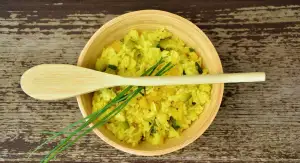Whip Up Homemade Buttermilk: A Step-by-Step Guide for Creamy Perfection

Buttermilk is a versatile and tangy dairy product that has been used in cooking and baking for centuries. Contrary to its name, buttermilk is not made from butter; rather, it is the liquid left behind after churning butter from cream. This slightly acidic liquid has a creamy texture and a tangy flavor, making it a popular ingredient in various cuisines around the world. Buttermilk is known for its ability to tenderize meats, add moisture to baked goods, and provide a unique flavor profile to dishes.
Ingredients needed for making Buttermilk
To make homemade buttermilk, you will need just two simple ingredients: whole milk and either lemon juice or white vinegar. For every cup of buttermilk needed, simply add 1 tablespoon of lemon juice or white vinegar to a measuring cup. Then, pour in enough whole milk to reach the 1-cup mark. Stir the mixture gently and let it sit at room temperature for about 10-15 minutes until it thickens slightly and curdles. This easy substitution is a great way to create a tangy and creamy buttermilk alternative for your culinary creations.
Steps to make Buttermilk at home
To make buttermilk at home, you will need just two simple ingredients: whole milk and either lemon juice or white vinegar. Start by pouring 1 tablespoon of lemon juice or white vinegar into a measuring cup. Then, add enough whole milk to reach the 1-cup mark. Stir the mixture gently and let it sit at room temperature for about 10-15 minutes. The acid in the lemon juice or vinegar will cause the milk to curdle slightly, creating a buttermilk-like consistency. Your homemade buttermilk is now ready to use in your favorite recipes!
Tips for storing Buttermilk
When storing homemade buttermilk, it's important to keep it in an airtight container to prevent absorption of other odors from the fridge. Glass jars or plastic containers with tight-fitting lids work well. Make sure to label the container with the date you made the buttermilk so you can track its freshness. Buttermilk can last in the refrigerator for up to 2 weeks, but always check for any signs of spoilage before using it in recipes. If you have leftover buttermilk that you won't use within that time frame, consider freezing it in ice cube trays for easy portioning in future recipes.
Creative ways to use Buttermilk in recipes
1. **Marinades:** Buttermilk is a fantastic tenderizer for meats like chicken, pork, or even tofu. The lactic acid helps break down proteins, resulting in juicy and flavorful dishes.
2. **Baking:** Buttermilk adds a tangy flavor and moisture to baked goods like pancakes, muffins, and cakes. It also reacts with baking soda to create a light and fluffy texture in biscuits and scones.
3. **Salad Dressings:** Create creamy dressings by combining buttermilk with herbs, garlic, and lemon juice for a refreshing twist on traditional salads.
4. **Frozen Treats:** Use buttermilk to make homemade ice cream or popsicles for a tangy and rich dessert option.
5. **Sauces:** Buttermilk can be used as a base for creamy sauces like ranch dressing or tzatziki sauce, adding depth of flavor and a velvety texture to your dishes.
Incorporating buttermilk into your recipes not only enhances the taste but also provides added nutritional benefits due to its high calcium content and probiotic properties. Experiment with these creative ideas to elevate your culinary creations while reaping the health benefits of this versatile ingredient.
Health benefits of consuming Buttermilk
Health Benefits of Consuming Buttermilk:
1. Probiotics: Buttermilk is rich in probiotics, which are beneficial bacteria that promote a healthy gut microbiome. These probiotics can help improve digestion and boost overall gut health.
2. Calcium: Buttermilk is a good source of calcium, essential for maintaining strong bones and teeth. Adequate calcium intake also plays a role in muscle function and nerve transmission.
3. Low in fat: Compared to regular milk, buttermilk is lower in fat content, making it a healthier option for those watching their fat intake while still enjoying dairy products.
4. Rich in vitamins: Buttermilk contains essential vitamins like B12, riboflavin (B2), and phosphorus, which are important for energy production, red blood cell formation, and bone health.
5. Hydration: Buttermilk is a hydrating beverage that can help replenish fluids lost through sweat or during hot weather, making it a refreshing choice to stay hydrated.
Incorporating buttermilk into your diet can offer these health benefits along with its delicious taste and versatility in cooking.
In conclusion, buttermilk is a versatile and nutritious dairy product that can easily be made at home with just two simple ingredients. It not only adds a tangy flavor to dishes but also provides numerous health benefits such as being rich in probiotics, calcium, and vitamins. By incorporating buttermilk into your diet, you can improve digestion, boost immunity, and promote overall gut health. So next time you're in the kitchen, consider whipping up a batch of homemade buttermilk to elevate your culinary creations and enhance your well-being.
Published: 09. 04. 2024
Category: Recipes



